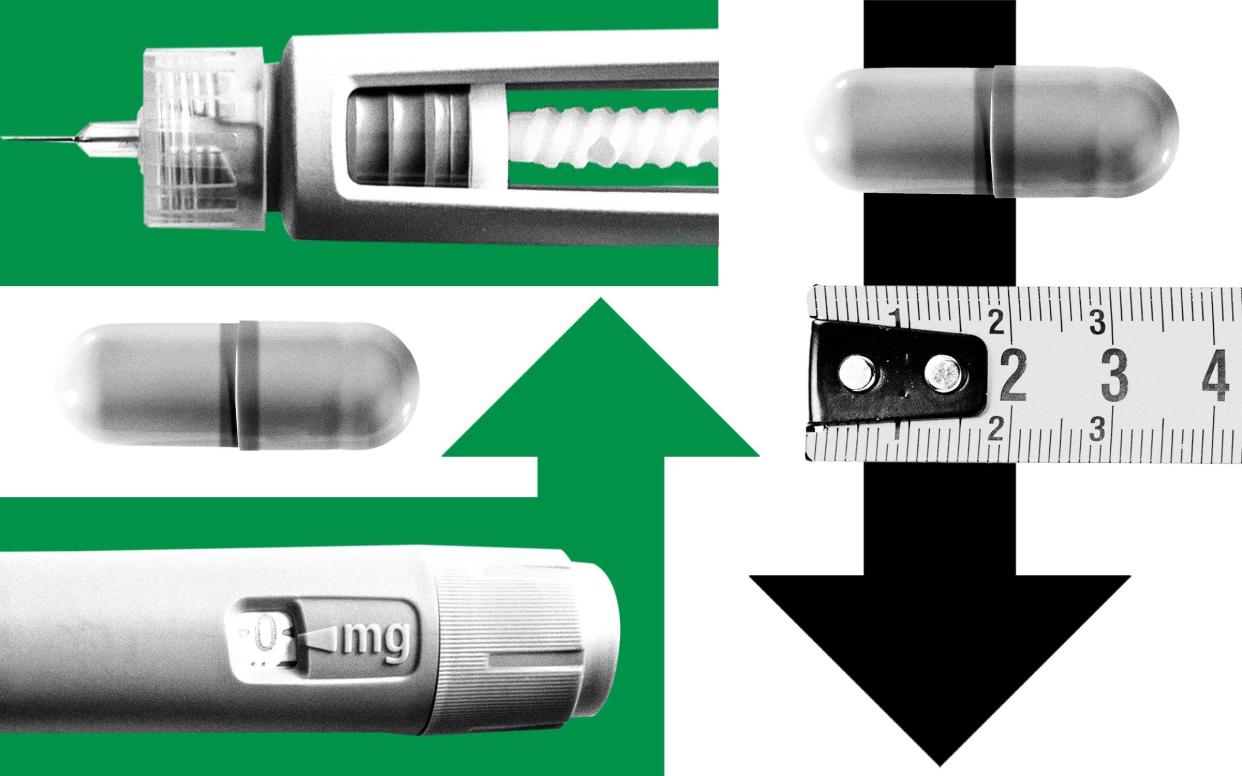New ‘Godzilla’ weight loss jab is even better than Ozempic, study suggests

A new “Godzilla” slimming jab is more powerful than Ozempic and can cut body weight by a quarter, research has found.
A study of the drug, retatrutide, shows the appetite suppressant is the best yet for losing weight compared with other weight loss injections.
The findings, presented at the European Obesity Congress in Venice, show users lost up to 24 per cent of their body weight in less than a year on average.
This compares with 15 per cent from Ozempic (a drug marketed for diabetes, and prescribed as Wegovy for weight loss) and 22.5 per cent for a newer drug, Mounjaro, both over a longer period.
The weekly retatrutide jab has a “triple whammy” effect - targeting three receptors, rather than Ozempic’s one - prompting it to be dubbed the “Godzilla” of these types of medication.
Ozempic and Wegovy hit a single receptor which reduces appetite and increases fullness. Mounjaro (also called tirzepatide) aims at a second target, which boosts its power, and increases weight loss.
The new retatrutide injections hit both of these - plus a third receptor, which speeds up the metabolism, so the body also burns more fat.
The trial results showed retatrutide helped obese people shed on average 60lb (4st 4lb or 27.2 kg) in just 48 weeks.
Women lost even more shedding 28.5 per cent of their body weight compared to 21.2 per cent in the male half of the trial.
Dr Ania Jastreboff, the study author and director of the Yale Obesity Research Center, said: “The results are striking.
“In a phase two trial, this degree of weight reduction in this time frame has not been seen.”
Describing the moment she presented early results to a gathering of scientists, Dr Jastreboff said: “The audience spontaneously clapped. I have not encountered that before.”
Jabs mimick hormones which regulate hunger
Weight loss jabs currently being prescribed on the NHS reduce appetite by mimicking hormones which regulate hunger and feelings of fullness. They are designed to act like one of these hormones, known as glucagon-like peptide 1 (GLP-1).
The two biggest selling drugs are branded as Wegovy or Ozempic, which are both the same drug (semaglutide), but sold at different doses.
Originally designed to tackle Type 2 diabetes, semaglutide was repurposed for obesity and trials showed its stronger dose form, branded as Wegovy, could help users lose 15 per cent of their body weight in 68 weeks.
The drugs, manufactured by Novo Nordisk, have become popular globally after celebrities including Oprah Winfrey, Sharon Osbourne, Elon Musk and even ex-PM Boris Johnson boasted about trying them for weight loss.
After them came a new drug called Mounjaro which, as well as mimicking GLP-1, also targeted a hormone called GIP to boost its effect on appetite suppression.
Trials showed it helped obese people on the highest dose lose an average of 22.5 per cent of their body weight in 72 weeks.
These injections are all now approved on the NHS, though prescribed privately in far greater numbers.
The phase 2 trials of retatrutide show its impact on weight loss could be the biggest yet.
The study of 338 obese people, published in the New England Journal of Medicine, saw participants lose 24 per cent of body weight over a 48-week period.
At the point the trial ended, they were yet to hit a plateau - meaning the drug could be even more powerful.
Experts believe that, given longer on the drug, it could help users shed as much as 30 per cent.
Retatrutide the ‘Godzilla’ of GLP-1s
As well as GLP-1 and GIP hormones, retatrutide targets a third hormone known as glucagon which triggers the body to burn more calories when we move.
Dr Jastreboff explained: “These medicines target these receptors in the brain. They target the same receptors in various tissues in our body as well as our brain to impact energy homeostasis.”
Prof Julio Rosenstock, of the University of Texas, previously conducted a separate trial looking at retatrutide in people with Type 2 diabetes.
“We know that tirzepatide (Mounjaro) is the King Kong of the GLP-1s. And when I look at retatrutide, I think that there is no question that Godzilla is smiling,” he said.
Retatrutide, like all previous GLP-1 drugs, has reported side effects including nausea, diarrhea and constipation.
However, trials which reported at the weekend found the medication could be just as effective at one third the dose.
Phase 3 trials are now underway to see how much more weight users can drop as well as assessing side effects and checking for more serious problems.
These will publish results in 2026.
Retatrutide could be available to buy and even be prescribed on the NHS within three years if approved by regulators.
Nadia Ahmad, Ely Lilly’s Associate Vice President for Obesity, is currently overseeing the retatrutide phase 3 trial.
She said: “We’re very excited about the level of weight loss retatrutide has achieved by activating three receptors, which makes it different to those currently on the market.
“Obesity is a serious, progressive disease. For some people medication may be required to address what is underpinning the disease to improve life outcomes.”

